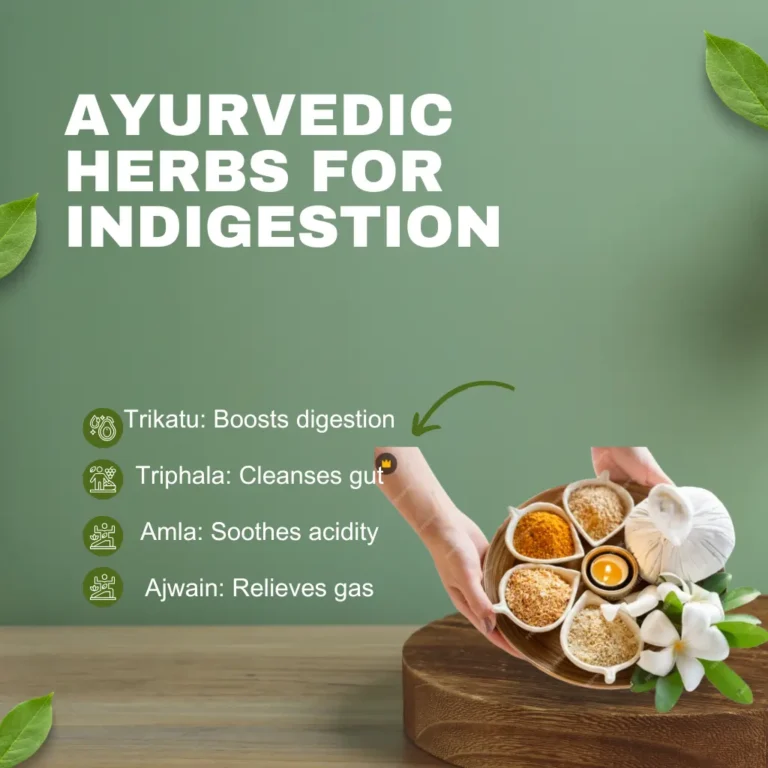Ayurvedic Herbs for Indigestion: Heal Your Gut Naturally
Introduction: The Ayurvedic Approach to Indigestion
Indigestion, or Ajirna as described in Ayurveda, is far more than an occasional discomfort. It signifies an imbalance in the body’s internal digestive mechanism, mainly governed by Agni (digestive fire). When Agni weakens, the process of breaking down and absorbing food becomes inefficient, resulting in accumulation of Ama (toxins) and triggering various symptoms like bloating, heaviness, acidity, gas, nausea, and fatigue. Unlike modern symptomatic treatments, Ayurveda focuses on restoring digestive balance by strengthening Agni, eliminating toxins, and harmonizing the body’s Doshas (Vata, Pitta, and Kapha). Among the many tools Ayurveda offers, herbs hold a central place, acting gently yet powerfully to restore digestive health.
This comprehensive guide explores some of the most effective Ayurvedic herbs for indigestion, their actions, benefits, and ways to use them for long-term gut health.
Ayurvedic Treatment for Indigestion
Why Ayurvedic Herbs are Effective for Indigestion
Ayurvedic herbs work holistically by:
-
Stimulating and balancing Agni (digestive fire)
-
Clearing Ama (undigested toxins)
-
Regulating bowel movements
-
Balancing Doshas (Vata, Pitta, Kapha)
-
Supporting the microbiome and gut lining health
-
Offering sustainable, long-term healing without dependency or side effects
Top Ayurvedic Herbs for Indigestion
1. Trikatu (Ginger, Black Pepper, Long Pepper)
Key Properties:
-
Deepana (enhances digestion)
-
Pachana (digests toxins)
-
Carminative and thermogenic
Benefits:
-
Boosts weak digestion by stimulating Agni
-
Reduces bloating, heaviness, and gas
-
Clears Ama from the gastrointestinal tract
-
Helps regulate metabolism
Best suited for:
Vata and Kapha type indigestion marked by sluggish digestion, bloating, and heaviness.
2. Triphala (Haritaki, Bibhitaki, Amalaki)
Key Properties:
-
Mild laxative
-
Rasayana (rejuvenative)
-
Anti-inflammatory and detoxifying
Benefits:
-
Supports regular bowel movements
-
Balances gut flora
-
Cleanses the gastrointestinal tract gently
-
Reduces chronic constipation and digestive stagnation
Best suited for:
Individuals with chronic constipation, bloating, incomplete digestion, and toxin accumulation.
3. Amla (Indian Gooseberry)
Key Properties:
-
Pitta-balancing
-
Antioxidant
-
Cooling and rejuvenative
Benefits:
-
Reduces hyperacidity and heartburn
-
Repairs gastric lining
-
Boosts Agni without overheating
-
Rich source of natural Vitamin C
Best suited for:
Acid reflux, burning sensations, and Pitta-related indigestion.
4. Ajwain (Carom Seeds)
Key Properties:
-
Carminative
-
Antispasmodic
-
Antimicrobial
Benefits:
-
Provides quick relief from gas and stomach cramps
-
Stimulates sluggish digestion
-
Improves nutrient absorption
-
Fights intestinal infections
Best suited for:
Gas, heaviness after heavy or improper meals, and Kapha-type indigestion.
5. Hing (Asafoetida)
Key Properties:
-
Vata-pacifying
-
Strong carminative
-
Antimicrobial
Benefits:
-
Reduces flatulence and stomach pain
-
Stimulates digestion
-
Relieves abdominal distention and cramping
-
Helps restore digestive function after overeating
Best suited for:
Gas, colic pain, and severe bloating caused by Vata disturbances.
6. Fennel Seeds (Saunf)
Key Properties:
-
Mild digestive stimulant
-
Cooling and soothing
-
Carminative
Benefits:
-
Soothes intestinal spasms
-
Reduces bloating and flatulence
-
Freshens breath
-
Promotes smooth digestion, especially after meals
Best suited for:
Post-meal digestive discomfort, mild bloating, and gas.
7. Cumin Seeds (Jeera)
Key Properties:
-
Agni stimulant
-
Anti-inflammatory
-
Mildly detoxifying
Benefits:
-
Enhances nutrient absorption
-
Stimulates digestive secretions
-
Reduces flatulence and heaviness
-
Balances all three Doshas gently
Best suited for:
Mild digestive weakness, postpartum care, and maintaining everyday digestive balance.
8. Licorice (Mulethi)
Key Properties:
-
Pitta pacifying
-
Mucoprotective
-
Anti-inflammatory
Benefits:
-
Heals gastric ulcers and inflammation
-
Reduces hyperacidity and burning
-
Soothes irritated stomach lining
-
Helps with gastritis and acid reflux
Best suited for:
Chronic hyperacidity, gastric ulcers, and inflamed mucosa.
9. Coriander Seeds (Dhania)
Key Properties:
-
Cooling
-
Pitta balancing
-
Digestive supportive
Benefits:
-
Reduces heat and burning in the stomach
-
Supports mild digestion
-
Aids in detoxification
-
Useful during hot weather and Pitta aggravation
Best suited for:
Mild hyperacidity, summer indigestion, and Pitta-type digestive disturbances.
10. Mint (Pudina)
Key Properties:
-
Cooling
-
Antispasmodic
-
Aromatic
Benefits:
-
Calms intestinal spasms
-
Relieves nausea and indigestion
-
Freshens breath
-
Soothes stomach lining
Best suited for:
Nausea, mild acid reflux, and general stomach discomfort.
Safe Use of Ayurvedic Herbs
While these herbs are generally safe when used properly, incorrect usage may lead to imbalances. It is important to:
-
Consult a qualified Ayurvedic practitioner for personalized dosage.
-
Use good quality, authentic herbs from reputable sources.
-
Follow dietary and lifestyle guidelines along with herbal intake for best results.
-
Avoid self-medication, especially if suffering from chronic illnesses or taking other medications.
Simple Home Remedies with Ayurvedic Herbs
-
Ajwain Water
Boil 1 teaspoon of Ajwain in one glass of water. Allow it to cool and drink after meals to relieve gas and improve digestion. -
Hing and Warm Water
Mix a pinch of Hing (asafoetida) in warm water and drink after meals to relieve abdominal bloating and cramps. -
Triphala at Bedtime
Take 1 teaspoon of Triphala powder with warm water at bedtime to promote regular bowel movements and cleanse the gut. -
Ginger Tea
Boil fresh ginger slices in water and sip slowly to stimulate Agni and prevent indigestion.
When to Consult an Ayurvedic Doctor
Seek professional help if you experience:
-
Chronic or recurring indigestion
-
Severe bloating, pain, or gas
-
Persistent acid reflux or heartburn
-
Unexplained changes in appetite or bowel movements
-
Long-term gastrointestinal disorders like IBS, GERD, ulcers, or constipation
A personalized Ayurvedic treatment plan may include herbs, Panchakarma detox therapies, diet, and lifestyle modifications tailored to your unique body constitution (Prakriti) and imbalances (Vikriti).
Conclusion: Trust Nature’s Pharmacy for Digestive Wellness
Indigestion, though common, signals deeper imbalances in your digestive system that require attention. Ayurvedic herbs provide time-tested, gentle, and sustainable solutions by supporting your body’s natural ability to digest, assimilate, and eliminate waste efficiently. When used correctly, these natural remedies can help you restore digestive strength, eliminate toxins, and enjoy vibrant health.
For long-term digestive health, combine these herbs with appropriate diet, daily routine, and mindful eating practices as guided by Ayurveda.
FAQ
Ayurvedic herbs help correct the root cause of indigestion by balancing Agni and Doshas. With proper diet and lifestyle, long-term relief is possible.
Mild indigestion may improve in days. Chronic cases may take weeks or months with consistent use and expert guidance.
Generally safe under supervision. Incorrect dosage or self-medication may cause imbalances. Always consult an Ayurvedic expert.
Ajwain, Hing, and Fennel are highly effective for gas, bloating, and abdominal discomfort.
Amla, Licorice, and Coriander are excellent for managing acidity and hyperacidity.


